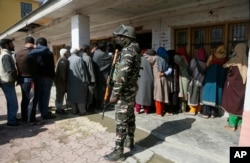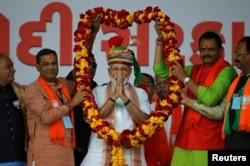Powerful regional parties that could play the role of kingmaker if India’s ruling Hindu nationalist Bharatiya Janata Party fails to win a clear majority were in the spotlight as millions voted in the second phase of the country’s staggered election.
Polling was also held in Srinagar, the main city of Indian Kashmir amid heavy security and a boycott call by separatist leaders. But unlike the rest of the country where voters queued early in long lines to beat the scorching summer heat, polling booths in the restive region’s summer capital wore a relatively deserted look. Internet services were shut down and police in riot gear patrolled the streets.
Over 155 million voters were eligible to cast ballots across 12 states for 95 parliamentary seats in the 545 member house in Thursday’s round of polling.
Prime Minister Narendra Modi urged people to vote in large numbers. “I am sure all those whose seats are polling today will strengthen our democracy by exercising their franchise,” he tweeted.
With the BJP unlikely to repeat the clear mandate he won five years ago, opposition parties are hoping to halt Modi’s return to power by forming an alliance if they win enough seats.
Their ambitions depend heavily on how regional heavyweights perform in electorally significant states like Tamil Nadu in the south, where 38 seats were up for grabs in Thursday’s round. The focus was also on half of the 28 seats being contested in Karnataka, another southern state where the BJP hopes to make up for losses it could suffer in its northern strongholds.
The BJP has warned of political instability if an opposition alliance comes to power and mocked these parties for lacking a common ideology. It has also stitched up alliances with some small parties.
India has been governed by coalitions led by either the Congress or the BJP for decades until Modi secured the first single party parliamentary majority in 30 years in 2014. But his five-year-rule has seen a growing chorus of criticism from opponents who accuse him of seeking to impose a Hindu majoritarian agenda on the country and undermining its secular ethos.
“Undoubtedly this is Modi versus the rest,” says Satish Misra at the Observer Research Foundation in New Delhi. “The contest is between Modi’s vision of India based on the fundamentals of Hindutva and strong leadership versus the liberal left of the center policies which focus on weaker sections of society.”
In a no-holds-barred campaign, Modi has played to the BJP’s nationalist, Hindu base and brushed aside criticism that he is using recent hostilities with Pakistan for electoral gain as he plays on national security concerns. “If farmers die, then it is an election issue, but when soldiers die then it is not an election issue? How can that be?” he told a television interviewer this week.
The Congress party on the other hand has attacked his economic record flagging the need to address rising unemployment and alleviate rural distress. It is promising a cash handout to 20 percent of India’s poorest families.
Polling was cancelled in one seat in Tamil Nadu after the Election Commission, which conducts the polls, said it found evidence of bribing voters. Political parties in India have long been accused of distributing cash, gifts and even gold in return for votes – Tamil Nadu this year topped the list of unaccounted cash seized with a record haul of $ 30 million during raids and vehicle checks in the last month.
There will be five more days of voting until May 19 and counting of votes will take place on May 23. Results are expected the same day.






